Luton in 1919
Book covering the Luton events of 1919 in bite-sized chunks, from the declaration of peace on June 28th to the children’s event at Luton Hoo Park in September, with the riots in some detail included along the way.
Old Luton Town Hall
William Austin in his 1928 book The History of Luton and its Hamlets wrote the following about the Town Hall: "A small Company was formed this year for the purpose of erecting a Town Hall, and, on the 27th August, 1847, the new building was opened". The entry for Luton in the Post Office Directory for Bedfordshire for 1847 says: "A handsome new Town Hall is now in the course of erection at the junction of the Dunstable and Bedford roads". Slater's Directoryfor Bedfordshire of 1850 states: "The town hall erected in 1848, in George-street, is a handsome and commodious building, comprising convenient apartments for the use of the county courts, and savings bank, with rooms for public lectures, concerts &c. - the entire forming a valuable improvement to the town".
Austin went on: "The cost of the ground and of the building was £2,200. It consisted of a basement under the front portion of the main building. On the ground floor on either side of the entrance were two good-sized rooms; one rented by the Luton Literary Institution and the other reserved for small meetings. Behind these was a fair-sized room with a small ante-room. In this larger room the Police and County Courts sat; the small room adjoining it served for witnesses".
"It was in the smaller room that the Savings Bank carried on its useful business for many years. On the first floor, approached by a broad staircase, was a large assembly hall, which was available for public meetings and entertainments".
"We do not think the Town hall Company ever paid its shareholders a dividend, and when, some thirty years later, it was purchased by the Town Council they were agreeably surprised to receive back in full the amounts they had contributed towards the erection of the building".
A letter in the Bedfordshire Times of 28th August 1847, dated 23rd August 1847, from "an Inhabitant of Long-Standing" struck a rather querulous note and one with slight similarities to the destruction of the building just under seventy two years later: "Sir, - As our Town Hall is nearly ready for the public service, I trust the opportunity will not be allowed to pass without some public demonstration being made, having for its object the promotion of a friendly feeling among ourselves, and for securing a more adequate appreciation of the trade and commerce of Luton among our neighbours. Would not a public dinner be the most appropriate method of securing these objects? The Marquis of Bute would probably take the chair, and invitations might be sent to the county members, and other influential gentlemen, whose presence is thought to be desirable. Whatever is done in this way should take place before the building is appropriated to its destined uses. On this account I am sorry that a County Court is to be held there this week, as the Hall will thus be associated in the minds of many with legal proceedings and compulsory payments, which, (although necessary measures) accord so sadly with these hard times".
Object Location:
![The Town Hall about 1900 [Z50/75/72] The Town Hall about 1900](https://worldwar1luton.com/sites/default/files/styles/large/public/objects/The%20Town%20Hall%20-%20the%20Belgium%20Arms%20left%20immediately%20.jpg?itok=33I_xS_3)
Classification:
Current Location:
Connects to:
Most Relevant Date:
Source:
Source Date:
Peace Day Riots
Event Start and End Date:
Saturday July 19th 1919 was a national day of celebrations. In Luton, events started with a procession to the Town Hall from Luton Hoo. Nearly 20,000 people enjoyed sports and entertainment at Wardown. No one could have foreseen how the day would end.
At the Town Hall, the Mayor read the Proclamation from the King. It praised the bravery of servicemen and welcomed members of the armed forces taking part in the procession. Booed by the crowds, the Mayor retreated to his Parlour in the Town Hall.
A small crowd burst into the Town Hall, smashing crockery and overturning tables. Police estimated that by the afternoon more than 8,000 people were in George Street. Unhappy ex-servicemen and other people made speeches.
By 10 o’clock that night, people armed with bricks, iron bars and bottles were looking for trouble. The Town Hall windows were smashed and a fire started in the Food Office at the side. It spread to the Town Hall itself. Firemen could not control the fire. Just after 12.30 the Town Hall clock crashed down. People looted shops. Someone played ‘Keep the Home Fires Burning’ on a piano from Farmer’s music shop. Military reinforcements were not able to bring order until 3 o’clock in the morning.
Images:
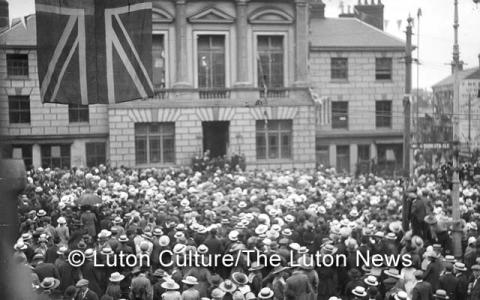
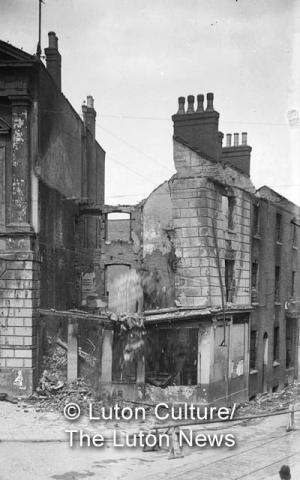
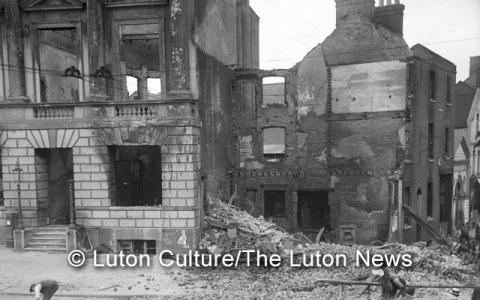
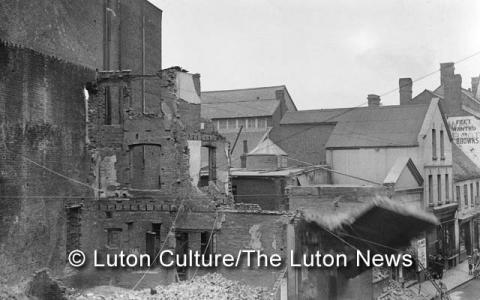
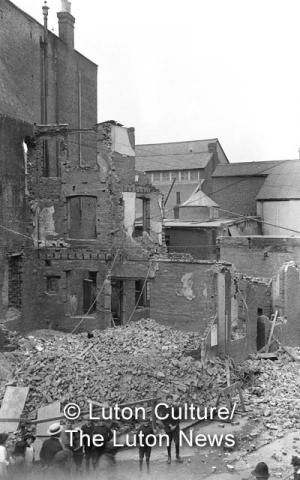
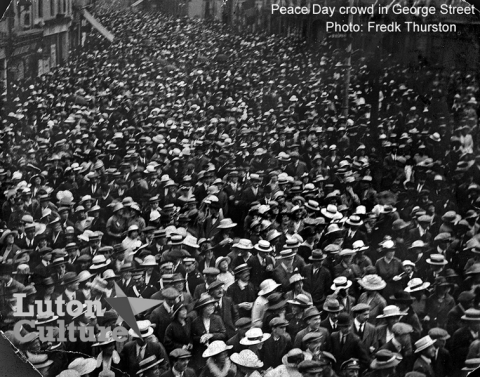
Event Place:
Connects to:
Preliminary plans for Peace Day
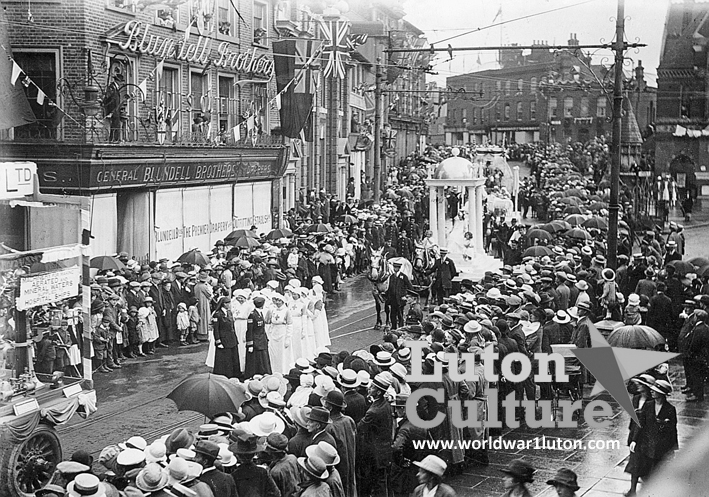
Reports of the Peace Celebration Committee were submitted to Luton Town Council by the Mayor (Councillor Henry Impey) on Tuesday, February 18th, 1919. They recommended:
That official recognition be given to a proposed performance by the Luton Choral Society at St Mary's Church in connection with the celebrations.
That a scheme of decoration for the Town Hall prepared by the Borough Surveyor be approved.
That the tender of Messrs J. Pain & Son to provide a display of fireworks at a cost of £100 be accepted.
That flags and streamers be purchased from Messrs Barnes & Co, Wood Street, London, at a cost of £50, their tender being lower than a local one submitted.
That the cost of the firework display be defrayed from private subscription.
That the following sketch programme be approved – Procession; decoration and illumination of Town Hall and Corn Exchange; illumination of Wardown Lake; fireworks; bands; concerts, dancing; sports; souvenir for schoolchildren; Luton Choral Society performance at St Mary's Church; subscription banquet.
The report further stated:
Finance – You Committee have further considered the question of the mode of providing funds for defraying the cost of the peace celebrations, and the Mayor announced he was prepared to give £100 towards the expenses. Resolved: That having regard to the number of recent appeals to the public for subscriptions to charitable funds, and to the important appeal which will be made for funds for a local War Memorial, this Committee are of opinion that the cost of the local peace celebrations (except fireworks) should be defrayed out of public funds, and therefore recommend the Council to authorise them to expend, out of the Borough Fund, a sum not exceeding the produced (approximately £500) of a rate of one halfpenny in the pound for such purpose.
The adoption of the reports was moved by the Mayor and seconded by Councillor Barford, and an interesting debate ensued.
It was stated that the replies received from the firms approached as to sending decorated cars had been most satisfactory; and in regard to the illumination of Wardown it was hoped to provide a method which could be used on subsequent occasions.
The discussion ranged mainly on the question of the advisability of including a firework display and whether the whole cost should be met from private subscriptions or from rate-aided funds. Points made were:
The Mayor (Councillor Henry Impey): The bulk of the cost should be spread over the whole town, for it was not desired to prejudice the appeal which would be made for funds for a War Memorial.
Councillor Barford: It was hoped to make it such a day as Luton had never seen, and as probably no one living would see again; and no ratepayer would object to a rate of a halfpenny in the £.
Councillor Bone: The nation had seen enough fireworks and he regarded the Committee's proposal as completely unnecessary and a waste of money.
The Deputy Mayor (Councillor C. Dillingham): Opposed fireworks being purchased from public funds and favoured the whole cost being raised by private subscription. £500 was nothing in a town like Luton.
Councillor Attwood: Some wanted fireworks, and the Council should be open-minded in the matter; whilst providing the funds from the rates would be the fairest way to all.
Councillor Briggs: Agreed with the Deputy Mayor that nothing should be paid from the rates, and thought the figure of £500 could easily be improved on by private effort. Moved an amendment giving effect to this principle.
Councillor Hubbard: Seconded, saying he thought there would be no difficulty in raising the money and that the appeal for a permanent War Memorial would not be prejudiced.
Councillor Barford: The expenditure would not be limited to £500; that was merely the Council's lead, and a proof that they were prepared to contribute a portion of the amount required.
Alderman Wilkinson: Supported the Committee's “nice modest programme,” which catered for all sections. Approved of the firework display, recalling how popular a similar event proved on the occasion of the Coronation.
The amendment was lost, only four members (Councillors Dillingham, Briggs, Unwin and Hubbard) voting in favour. The report was adopted.
[The Luton News: Thursday, February 20th, 1919]
- Deejaya's blog
- Log in or register to post comments